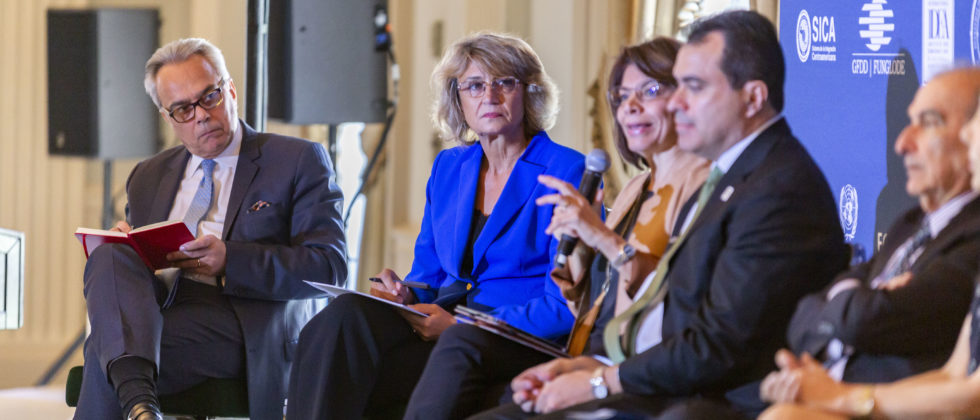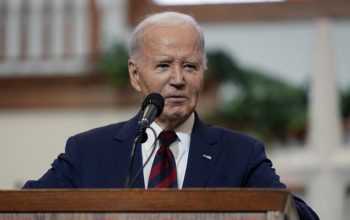news
The Global Forum Comes to a Close with Moderate Optimism for the Immediate Future of Latin America and the Caribbean
September 27, 2019
New York – The Global Forum Latin America and the Caribbean 2019 ended this Friday with “cautious” and “moderate optimism” for the next decade in the region, as former heads of State and experts debated in the final panel, “Democracy in Latin America and the Caribbean: current challenges.” Laura Chinchilla, former president of Costa Rica and vice-president of World Leadership Alliance-Club de Madrid; Kevin Casas Zamora, former second vice-president of Costa Rica and secretary general of International IDEA, and Humberto de la Calle, former vice-president of Colombia and former lead negotiator for the Colombian government for the peace talks with the FARC made up part of the panel. It also featured Jorge Castañeda, former minister of Foreign Relations of Mexico and distinguished professor of Politics and Latin American and Caribbean studies at NYU; Jorge Taiana, former minister of Foreign Relations of Argentina and general director of Centro Internacional de Estudios Políticos(CIEP), Universidad Nacional de San Martín andMaría Eugenia Mosquera, Historian, Latin America and Geopolitics Specialist; President and Founder of cultural TV channel VALETV.
Daniel Zovatto, regional director for Latin America and the Caribbean at International IDEA and Natasha Despotovic, executive director of the Global Foundation for Democracy and Development (GFDD)served as moderators.
The panel, which closed out the two sessions of discussion and debate on the current situation in the region, aimed to identify main challenges for democracy and development over the next decade in Latin America.
The speakers pointed out the “trade war” between China and the United States, the uncertainty and the volatility in the world and fear of a global economic recession.
They also made reference to dissatisfaction with democracy and institutional weakness that exists in Latin America and the Caribbean, while they wondered what could be done so that the next decade would be a “winning decade.”
“In a certain sense, we’ve seen a series of elements that suggest a weakening of democratic institutions in Latin America,” said Laura Chinchilla, former president of Costa Rica and vice-president of the World Leadership Alliance – Club de Madrid.
She made reference to elements such as judicial independence and indefinite re-election as well as the perception people have of democracy.
“The discontent toward democracy has grown and it requires us to reflect,” explained Chinchilla, who during the panel expressed “cautious optimism” about the future of the region.
Kevin Casas Zamora asked that we not forget “how much [the region] has advanced” because he believesthat “democracy in Latin American and the Caribbean have some results to show.”
“Levels of human development in the region have not stopped advancing and I suspect that two things, the capacity to develop democratic elections that function well and the increased level of human development, go hand-in-hand” added Casas Zamora.
Humberto de La Calle, former vice-president of Colombia, made reference to the “crisis of the liberal narrative.” “When it comes to the topic of representative democracy in Latin America we are losing sight of the fact that there is something more fundamental which is the crisis of the liberal narrative,” he explained.
“Representative democracy is an instrument of that narrative and what we see in the world is an increase in populism, autocracy, fake news, social media, bigotry, loss of the separation of powers,” he emphasized.
Jorge Castañeda, former minister of Foreign Relations of Mexico, emphasized the need to build “supranational institutions” in the hemisphere “with or without the United States and Canada” to take on questions that face every country such as climate change.
He considered that “in many aspects, if we are honest, we have to recognize that we cannot do it alone.”
The speakers also shared thoughts on “a new agenda for Latin America” that includes, alongside climate change, a way to address the “fourth industrial revolution,” automatization, artificial intelligence and the impact of social media on democracy.
Increase of Inequality
“We have democracy, we have a democratic pact, we have survived hyperinflation, military uprisings, military governments, but democracy is not in question. We have changes of government and alternation in the framework of processes recognized by one another,” highlighted Taiana.
Despite this, he expressed concern over the increase of inequality and asked to make reality the affirmation that former Argentine president Raúl Alfonsín made in1983 that “with democracy one eats, one heals, and one learns.”
Mosquera spoke about the situation in Venezuela and considered it key that the country “go through re-institutionalization” and insisted that it seek “a peaceful and democratic solution.”
“A dialogue or a negotiation on the conditions that we have had until now, even as a political instrument hasn’t worked up until now, but this doesn’t mean that it can’t function in the future when we have a negotiation, a dialogue with the appropriate and necessary elements to seek a peaceful solution, a democratic solution,” she added.
The Global Forum Latin America and the Caribbean 2019 was organized by the Global Foundation for Democracy and Development, Fundación Global Democracia y Desarrollo and the International Institute for Democracy and Electoral Assistance (International IDEA).
The event also had the support of the Economic Commission for Latin America and the Caribbean,World Leadership Alliance–Club de Madrid, the Institute of Latin American Studies at Columbia University and the Central American Integration System.
More information about the Global Forum Latin America and the Caribbean
About the panelists: https://www.globalforumlac.org/en/panelistas/
Join the conversation @GlobalForumLAC on Twitter, Facebook and Instagram.



































